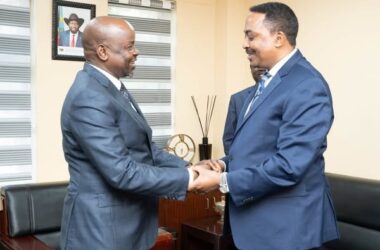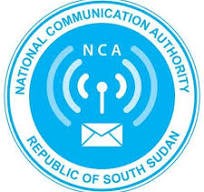By William Madouk
South Sudan Business Community’s Chairperson, Ayii Duang Ayii, proposes removal of the minister of Finance over prevailing economic crises hitting the country.
In a press conference on Thursday, Mr. Ayii claimed that minister, Dier Tong Ngor had failed to treat South Sudan’s ailing economy.
The tycoon submits his proposal to President Salva Kiir Mayardit and parties to peace agreement, for consideration.
“As I speak to you, a dollar is at SSP 1,050. That’s why we appeal to the president and head of political parties who have finance portfolio that minister of Finance had failed and should be removed,” he stated.
Business community boss argued that if the minister remains in the finance docket, the dollar rate will continue to shoot up and commodity prices will hike along.
Mr. Ayii cited that basic commodities would continue to rise if the situation is not addressed in time.
The business tycoon also demands a halt of auctioning hard currency and traders be given money directly to buy commodities to tame the high prices.
Mr. Ayii, who is optimistic of the current economic situation, said he received complaints from traders threatening to close down their businesses because of hyperinflation, but told them to be patient.
The business tycoon also offers an alternative for the minister to opt for peaceful resignation, as he seems not to have plans to overcome the dwindling economic.
Mr. Ayii is not alone in furor, as South Sudan’s economy progressively worsens each passing day, with commodity prices increasing more times than expected. The situation has attracted several commentators, offering solutions as well as criticisms.
Meanwhile, as some people point at the central bank, others believe the matter lays within the government dockets; hence ministers and their respective technocrats become subjects of divergent public perception.
For Mr. James Boboya, Executive Director of Institute for Social Policy and Research, the government should set proper mechanisms to control foreign exchange and currency flow in the market.
According to Boboya, monetary devaluation and widespread of hard currency makes citizens to consider US dollar as a commodity. He attributed this to policies of Central Bank of South Sudan that encourages the sale of dollars in black markets.
Boboya said the black market survives by some fellows at the Central Bank who have framed positive policies to protect the illicit market.
Meanwhile, Central Equatoria State, Chamber of Commerce, Chairperson, Mr. Robert Pitia, one of those concerned of the economic crisis, blamed the situation, on foreign and national economic policies.
“The external factors are that the food prices have now increased, and other taxes being introduced by our neighbouring countries on the goods which are coming to our country,” Pitia observed.
He noted that these external factors were beyond the control of South Sudan.
Pitia argued that the internal factors that government could control include multiple taxes on different levels of government, such as national, state, county and city council revenue authorities.
He also listed numerous other institutions that levy taxes on traders which eventually prompts increase on commodity prices.
“We have rented value and business profit tax, standard bureau, national and state Fire Brigade. All these institutions collect money and increase their rates every year”, Pitia disclosed, saying these should be harmonized.
Recently, the national Assembly summoned three ministers over the declining economic landscape of the country without an indication of transformation.
The parliamentarians pointed out domination of businesses by foreign monopolists, leaving domestic enterprises to suffocate as continuous cash outflow leaves the country’s economy to stagnate.
However, the minister of investment, Dr. Dhieu Mathok Ding links the continuous decline in the country’s economy as well as investment to high rate of dependency on imports and poor infrastructure.
He said observed the need for South Sudanese to stop blame games and allow investors to continue developing the nation.



